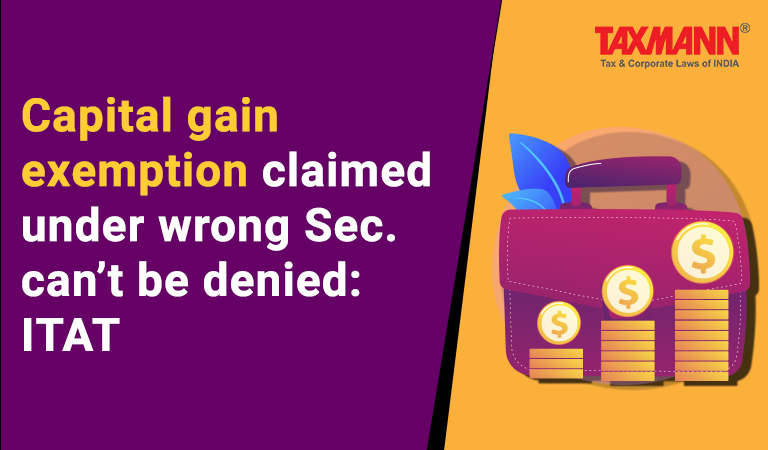Capital gain exemption claimed under wrong Sec. can’t be denied: ITAT
- Blog|News|Income Tax|
- 2 Min Read
- By Taxmann
- |
- Last Updated on 2 September, 2022

Case Details: ITO v. Armine Hamied Khan - [2022] 142 taxmann.com 14 (Mumbai-Trib.)
Judiciary and Counsel Details
-
- Pramod Kumar, Vice-President & Anikesh Banerjee, Judicial Member
- Soumendu K Dash for the Appellant.
- Yogendra N Thakkar & Deepak S Sukhija for the Respondent.
Facts of the Case
Assessee was a non-resident lady and had tenancy rights in a residential apartment in the posh South Mumbai locality of Warden Road. She surrendered these tenancy rights for a consideration of Rs 4,76,80,552. The funds so received by her, along with an additional amount of Rs 56,80,230, were invested in the purchase of a new residential flat in the upcoming Lower Parel area nearby.
While filing up the Income-tax return (ITR), instead of mentioning section 54F as the section in which the tax exemption of capital gain is claimed, she mentioned section 54. She tried attempted to correct the mistake when the scrutiny assessment proceedings were in progress.
However, the Assessing Officer (AO) rejected the claim on the ground that the assessee was trying to make a fresh claim during scrutiny. Said claim can be admissible only by way of filing a revised return of income. On appeal, the assessee got relief from the CIT(A). Aggrieved-AO filed the instant appeal before the Tribunal.
ITAT Held
The Tribunal held that where a claim for exemption was rightly made, but only a wrong section was quoted (section 54 instead of section 54F) while making a claim, it is sufficient that assessee brings it to AO’s notice during scrutiny assessment proceedings and requests AO to allow under the correct section.
Correcting a section during assessment proceedings does not amount to making a fresh claim and AO cannot refuse deduction/exemption on the ground that no revised return was filed by the assessee.
Therefore, the AO was indeed in error in adopting such a hyper-pedantic approach and in holding that there was a fresh claim for exemption under section 54F. The grievance raised by the AO was, therefore, devoid of any legally sustainable merits. It proceeded on the fallacious assumption that a change of section, on account of an inadvertent and bonafide error, under which the claim was made, by itself, amounts to a fresh claim.
Disclaimer: The content/information published on the website is only for general information of the user and shall not be construed as legal advice. While the Taxmann has exercised reasonable efforts to ensure the veracity of information/content published, Taxmann shall be under no liability in any manner whatsoever for incorrect information, if any.

Taxmann Publications has a dedicated in-house Research & Editorial Team. This team consists of a team of Chartered Accountants, Company Secretaries, and Lawyers. This team works under the guidance and supervision of editor-in-chief Mr Rakesh Bhargava.
The Research and Editorial Team is responsible for developing reliable and accurate content for the readers. The team follows the six-sigma approach to achieve the benchmark of zero error in its publications and research platforms. The team ensures that the following publication guidelines are thoroughly followed while developing the content:
- The statutory material is obtained only from the authorized and reliable sources
- All the latest developments in the judicial and legislative fields are covered
- Prepare the analytical write-ups on current, controversial, and important issues to help the readers to understand the concept and its implications
- Every content published by Taxmann is complete, accurate and lucid
- All evidence-based statements are supported with proper reference to Section, Circular No., Notification No. or citations
- The golden rules of grammar, style and consistency are thoroughly followed
- Font and size that’s easy to read and remain consistent across all imprint and digital publications are applied



 CA | CS | CMA
CA | CS | CMA
